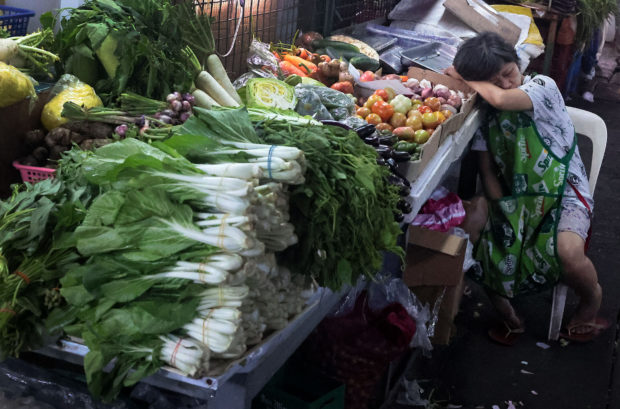Food cost, utilities, rent drive inflation to 8.7%

FRESH BUT EXPENSIVE | High prices of farm products such as these vegetables at a stall in Kamuning Market in Quezon City contributed to the surge in inflation. (Photo by GRIG C. MONTEGRANDE / Philippine Daily Inquirer)
MANILA, Philippines — Inflation, a measure of the rate of increase in the prices of basic goods and services, surged to a new 14-year high of 8.7 percent in January, breaching the forecast of the Bangko Sentral ng Pilipinas (BSP) of between 7.3 and 8.3 percent, as well as estimates of private economists of 7.6 percent.
National statistician Dennis Mapa said in a press briefing that the January rate was the fastest since the 9.1 percent in November 2008, when there was a global financial crisis. It was also almost thrice as fast as the 3 percent recorded a year ago, and surpassed the 8.1 percent in December 2022, which was expected to have been the peak.
The high inflation footprint is expected to prompt the BSP to raise interest rates to address further price pressures.
In a video message released by the Presidential Communications Office on Tuesday, President Ferdinand Marcos Jr. said it was “unfortunate” that inflation rose at its fastest pace in 14 years.
“I suppose it can only be said that the measures that we have taken have not yet gone through the system,” Marcos said.
However, he noted that the rate is expected to go down by the second quarter as prices of fuel and imported agricultural products continue to decline.
“We have already taken some measures so that the supply will be greater and so that will bring the prices down, but that will take a little time,” he added.
In an Instagram post, the president said the government was “fighting inflation head-on” with short-term measures such as easing import restrictions, monitoring prices, providing social support, fuel subsidies and buffer stock for key commodities.
Marcos had allowed the importation of onions due to local supply shortfalls and had ordered a two-month buffer inventory of sugar to avoid a shortage.
With the continuing decline in the prices of fuel and agricultural products, he said the inflation rate would eventually slide down.
“I think that we will see the effects on the inflation rate further down the road and I sincerely believe that (the January rate) is going to be as high as it’s going to get,” he said in his video message.
Major contributors
Mapa said the latest inflation rate was mainly driven by faster increases in the prices of housing rentals, electricity and water, as well as those of vegetables, milk and eggs, and fruits and nuts.
According to Mapa, the commodity group that includes housing, water, electricity, gas and other fuels was the main reason that inflation in January went faster than in December as this accounted for half of the overall inflation observed across the nation in January.
In particular, housing rentals increased by 5 percent in January, which was much faster than the 4 percent rise in December.
“Rental had been stable in the past three years at the height of the pandemic,” Mapa said. “But this picked up in January as a result of economic reopening.”
Also, the price of electricity surged by 22 percent in January compared to the same month of 2022, faster than the 20-percent rise in December.
The second biggest contributor to overall inflation in January was food and non-alcoholic beverages. This group of goods saw prices go up by 11 percent, and represented 30 percent of nationwide inflation in January.
Prices in the subgroup that includes vegetables and onions shot up by 38 percent in January from 32 percent in December.
Other individual items mentioned were eggs and bananas. The subgroup that includes eggs [milk, other dairy products, and eggs] saw prices go up by 10 percent while fruits and nuts saw prices go up by 8 percent.
Other commodity groups that recorded faster increases in prices included alcoholic beverages and tobacco; clothing and footwear; furnishings, household equipment and routine household maintenance; health; recreation, sport and culture; restaurants and accommodation services, and miscellaneous goods and services.
Gov’t measures
Finance Secretary Benjamin Diokno said on Tuesday that the government was intensifying measures to increase local production and agricultural productivity.
As an intermediate action, he said the administration has temporarily reduced import restrictions on essential commodities, including rice and coal which fuels power plants.
“With the peso [value against the US dollar] stabilizing, oil prices falling and a relatively mild La Niña—suggesting less unpredictable weather—expected in the first half of the year, I expect the [slowdown of rising] prices to start in the first quarter of 2023,” he noted.
Secretary Arsenio Balisacan of the National Economic and Development Authority (Neda) said the government was firming up its focus on easing price pressures and cushioning the impact of inflation.
He added that, in the medium to long term, the priority consists of ensuring food security through higher agricultural productivity and ensuring energy security by pursuing the energy transition and development program.
“Our measures are meant to balance the interests among local food producers, consumers, and the overall economy,” Balisacan said.
“A robust and resilient agriculture is vital to ensuring that we have enough supply of food and to keeping food prices stable, especially as we continue to face global headwinds and are exposed to natural hazards. Importantly, it serves as the foundation for a strong economy, as agricultural products move up the value chain,” he added.
In a press statement, Presidential Communications Secretary Cheloy Velicaria-Garafil cited the International Monetary Fund’s January 2023 World Economic Outlook Update, saying that inflation would continue to be a challenge to countries around the world.
